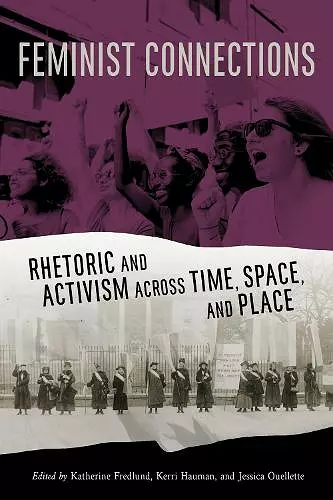Feminist Connections
Rhetoric and Activism across Time, Space, and Place
Katherine Fredlund editor Kerri Hauman editor Jessica Ouellette editor
Format:Hardback
Publisher:The University of Alabama Press
Published:30th Oct '20
Should be back in stock very soon

Highlights feminist rhetorical practices that disrupt and surpass boundaries of time and space
In 1917, Alice Paul and other suffragists famously picketed in front of the White House while holding banners with short, pithy sayings such as “Mr. President: How long must women wait for Liberty?” Their juxtaposition of this short phrase with the image of the White House (a symbol of liberty and justice) relies on the same rhetorical tactics as memes, a genre contemporary feminists use frequently to make arguments about reproductive rights, Black Lives Matter, sex-positivity, and more. Many such connections between feminists of different spaces, places, and eras have yet to be considered, let alone understood. Feminist Connections: Rhetoric and Activism across Time, Space, and Place reconsiders feminist rhetorical strategies as linked, intergenerational, and surprisingly consistent despite the emergence of new forms of media and intersectional considerations.
Contributors to this volume highlight continuities in feminist rhetorical practices that are often invisible to scholars, obscured by time, new media, and wildly different cultural, political, and social contexts. Thus, this collection takes a nonchronological approach to the study of feminist rhetoric, grouping chapters by rhetorical practice rather than time, content, or choice of media.
By connecting historical, contemporary, and future trajectories, this collection develops three feminist rhetorical frameworks: revisionary rhetorics, circulatory rhetorics, and response rhetorics. A theorization of these frameworks explains how feminist rhetorical practices (past and present) rely on similar but diverse methods to create change and fight oppression. Identifying these strategies not only helps us rethink feminist rhetoric from an academic perspective but also allows us to enact feminist activist rhetorics beyond the academy during a time in which feminist scholarship cannot afford to remain behind its hallowed yet insular walls.
“This collection puts forward a groundbreaking methodology for exploring connections between feminist texts across time. Asking critics to momentarily suspend context, content, and media, the contributors foreground similarities between rhetorical strategies that emerged at different moments of feminist activism. This method enables critics to see the interstitial and intersectional relationships between and among feminist rhetorics of all eras, arguments, and media. This methodology enables critics to put into conversation Victorian novels with #LikeALadyDoc, Ida B. Wells with #SolidarityIsForWhiteWomen, Jane Addams with #EuEmpregadaDomÉstica, women telegraphers with women coders, and early birth control technology with HIV prevention drugs.”
—Belinda A. Stillion Southard, author of How to Belong: Women’s Agency in a Transnational World “In their beautifully conceived and timely anthology, Feminist Connections, Katherine Fredlund, Kerri Hauman, and Jessica Ouellette manage what has seemed to be impossible. They have successfully disrupted feminist reception histories while seamlessly illuminating feminist social movement histories, feminist rhetorical strategies (both means and tools), and feminist technological epistemologies. Their collection, anchored in a method they refer to as Rhetorical Transversal Methodology (or RTM), prompts readers to face twenty-first-century questions of feminist rhetorical practices; historiographic relationships, intersections, and trajectories; and the constitution of digital work itself.”
—Cheryl Glenn, University Distinguished Professor of English at Penn State University and author most recently of Rhetorical Feminism and This Thing Called Hope
ISBN: 9780817320645
Dimensions: 229mm x 152mm x 25mm
Weight: 625g
312 pages